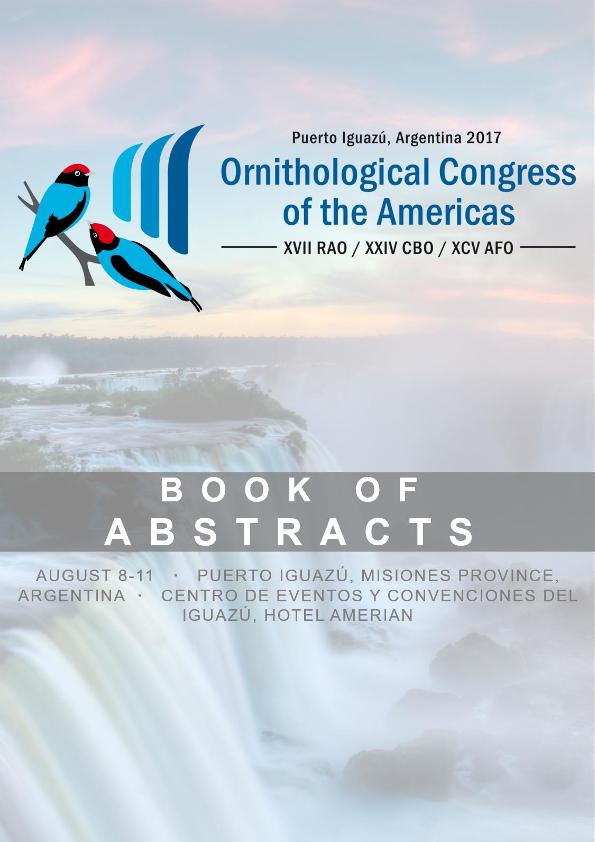Mostrar el registro sencillo del ítem
dc.contributor.author
Ballejo, Fernando

dc.contributor.author
Molares, Soledad

dc.contributor.author
Lambertucci, Sergio Agustin

dc.date.available
2023-02-22T20:20:46Z
dc.date.issued
2017
dc.identifier.citation
Do farmers consider bird scavengers as a problem? Evaluation of the perceptions of different rural communities; Ornithological Congress of the Americas; Puerto Iguazú; Argentina; 2017; 247-248
dc.identifier.uri
http://hdl.handle.net/11336/188644
dc.description.abstract
The conflict between humans and potential predators of livestock exists since the domestication of livestock. The negative perception of some livestock producers about carnivorous mammals (for example pumas) is well known. However, studies on human perception about scavenger birds are scarce. Our aim is to take an ethnozoological approach on the knowledge and attitudes of Patagonian rural worker (indigenous and criollos farmers), to identify possible conflicts between bird scavengers (obligate and facultative) and agricultural production in northwestern Patagonia. Semi-structured interviews were conducted with people in three focus groups: the mapuche community, the criollo community (<500 cattle) and cattle ranches (> 500 cattle). Almost all of the interviewees indicated at least one species as harmful to livestock. Southern Caracara (Caracara plancus) and Black-chested buzzard eagle (Geranoaetus melanoleucus) were the most common scavenger birds pointed out by criollo and mapuche communities. However, the Andean condor (Vultur gryphus) an obligate scavenger bird was also considered harmful in mapuche communities. On the other hand, the cattle ranches indicate as harmful C. plancus and the obligate scavenger bird, Black Vulture (Coragyps atratus). The three groups of people responded to the problem by eliminating the birds, as about half of the interviewees expressed this strategy as the most appropriate to reduce the predation damage perceived. We present a preliminary analysis of the perception of these social groups to be able to contrast it empirically in the field with possible predation, which can then be used to develop strategies to reduce conflict.
dc.format
application/pdf
dc.language.iso
eng
dc.publisher
Association of Field Ornithologists
dc.rights
info:eu-repo/semantics/openAccess
dc.rights.uri
https://creativecommons.org/licenses/by-nc-sa/2.5/ar/
dc.subject
ETHNOZOOLOGY
dc.subject
MAPUCHE
dc.subject
PATAGONIA
dc.subject.classification
Conservación de la Biodiversidad

dc.subject.classification
Ciencias Biológicas

dc.subject.classification
CIENCIAS NATURALES Y EXACTAS

dc.subject.classification
Ciencias Sociales Interdisciplinarias

dc.subject.classification
Otras Ciencias Sociales

dc.subject.classification
CIENCIAS SOCIALES

dc.title
Do farmers consider bird scavengers as a problem? Evaluation of the perceptions of different rural communities
dc.type
info:eu-repo/semantics/publishedVersion
dc.type
info:eu-repo/semantics/conferenceObject
dc.type
info:ar-repo/semantics/documento de conferencia
dc.date.updated
2022-05-12T07:27:07Z
dc.journal.pagination
247-248
dc.journal.pais
Estados Unidos

dc.description.fil
Fil: Ballejo, Fernando. Consejo Nacional de Investigaciones Científicas y Técnicas. Centro Científico Tecnológico Conicet - Patagonia Norte. Instituto de Investigaciones en Biodiversidad y Medioambiente. Universidad Nacional del Comahue. Centro Regional Universidad Bariloche. Instituto de Investigaciones en Biodiversidad y Medioambiente; Argentina. Universidad Nacional del Comahue. Centro Regional Universitario Bariloche. Laboratorio de Ecotono; Argentina
dc.description.fil
Fil: Molares, Soledad. Consejo Nacional de Investigaciones Científicas y Técnicas. Centro Científico Tecnológico Conicet - Patagonia Norte. Centro de Investigación Esquel de Montaña y Estepa Patagónica. Universidad Nacional de la Patagonia "San Juan Bosco". Centro de Investigación Esquel de Montaña y Estepa Patagónica; Argentina
dc.description.fil
Fil: Lambertucci, Sergio Agustin. Consejo Nacional de Investigaciones Científicas y Técnicas. Centro Científico Tecnológico Conicet - Patagonia Norte. Instituto de Investigaciones en Biodiversidad y Medioambiente. Universidad Nacional del Comahue. Centro Regional Universidad Bariloche. Instituto de Investigaciones en Biodiversidad y Medioambiente; Argentina
dc.relation.alternativeid
info:eu-repo/semantics/altIdentifier/url/http://www.afonet.org/2017iguazu/site/2017/08/06/abstract-book-now-available/
dc.conicet.rol
Autor

dc.conicet.rol
Autor

dc.conicet.rol
Autor

dc.coverage
Internacional
dc.type.subtype
Congreso
dc.description.nombreEvento
Ornithological Congress of the Americas
dc.date.evento
2017-08-08
dc.description.ciudadEvento
Puerto Iguazú
dc.description.paisEvento
Argentina

dc.type.publicacion
Book
dc.description.institucionOrganizadora
Association of Field Ornithologists
dc.description.institucionOrganizadora
Sociedade Brasileira de Ornitologia
dc.description.institucionOrganizadora
Aves Argentinas
dc.source.libro
Ornithological Congress of the Americas: Book of abstracts
dc.date.eventoHasta
2017-08-11
dc.type
Congreso
Archivos asociados
